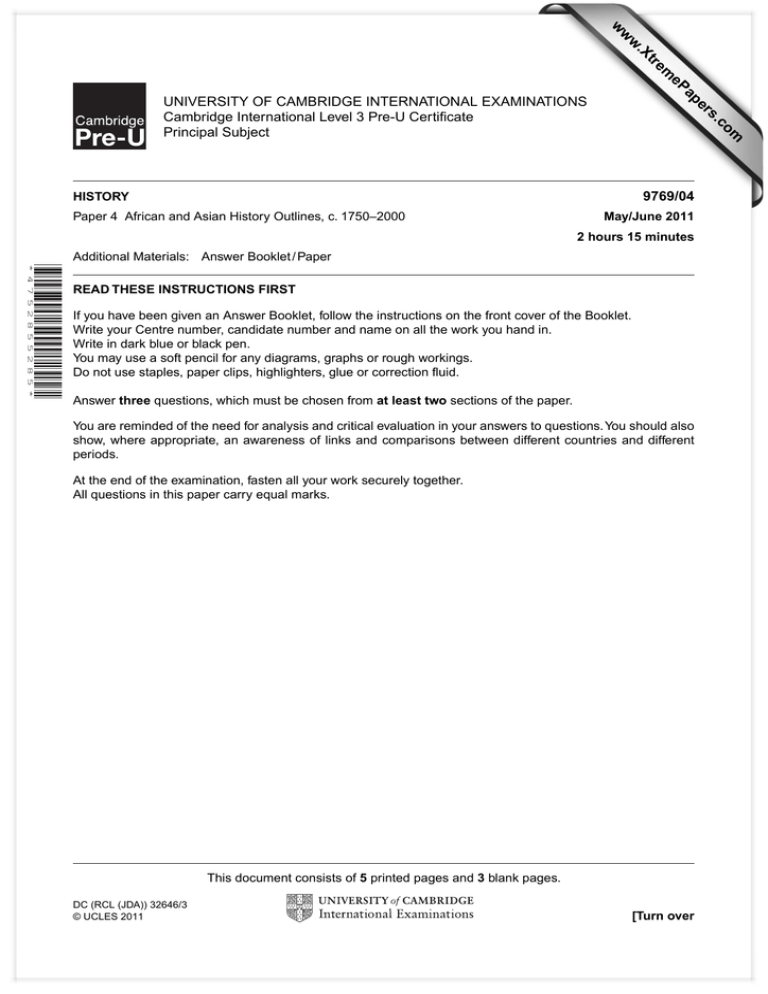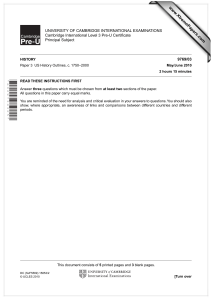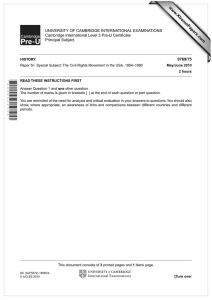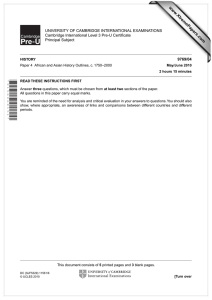www.XtremePapers.com
advertisement

w w ap eP m e tr .X w om .c s er UNIVERSITY OF CAMBRIDGE INTERNATIONAL EXAMINATIONS Cambridge International Level 3 Pre-U Certificate Principal Subject 9769/04 HISTORY Paper 4 African and Asian History Outlines, c. 1750–2000 May/June 2011 2 hours 15 minutes Additional Materials: Answer Booklet / Paper * 4 7 5 2 8 5 5 2 8 5 * READ THESE INSTRUCTIONS FIRST If you have been given an Answer Booklet, follow the instructions on the front cover of the Booklet. Write your Centre number, candidate number and name on all the work you hand in. Write in dark blue or black pen. You may use a soft pencil for any diagrams, graphs or rough workings. Do not use staples, paper clips, highlighters, glue or correction fluid. Answer three questions, which must be chosen from at least two sections of the paper. You are reminded of the need for analysis and critical evaluation in your answers to questions. You should also show, where appropriate, an awareness of links and comparisons between different countries and different periods. At the end of the examination, fasten all your work securely together. All questions in this paper carry equal marks. This document consists of 5 printed pages and 3 blank pages. DC (RCL (JDA)) 32646/3 © UCLES 2011 [Turn over 2 Section 1: North and East Africa 1 How important were economic factors in explaining European colonisation in North Africa in the period 1830–1914? 2 Why was the struggle for Algerian independence so prolonged in the period 1954–62? 3 How valid is the view that Nasser achieved little of lasting importance for Egypt? 4 How is the persistent instability in Somalia after 1960 best explained? 5 How is Gaddafi’s hold on power in Libya between 1969 and 2000 best explained? Section 2: West, Central and Southern Africa 6 How important were external pressures in bringing about the end of apartheid in South Africa? 7 How are the civil wars in the Democratic Republic of the Congo after 1997 best explained? 8 How successfully did Malawi deal with its internal problems after independence? 9 Explain the failure of Liberia to fulfil the dreams of its founders. 10 What best explains the civil conflict in Nigeria after independence? © UCLES 2011 9769/04/M/J/11 3 Section 3: Themes: Africa c.1750–2000 11 How important were strategic factors in explaining the Scramble for Africa in the period 1870–1914? 12 Assess the impact of the Second World War on the development of African nationalism. 13 To what extent and why did slavery survive in Africa in the twentieth century? 14 Assess the achievements of the Pan-African movement by 1945. 15 Why has the AIDS epidemic been such a difficult problem for Africa to deal with? 16 How important were economic factors in the changing role of women in Africa in the twentieth century? (You should refer to at least two countries in your answer.) Section 4: China 17 How important was Sun Yat-sen in the modernisation of China? 18 Assess the view that warlordism was the main obstacle to progress in China in the years 1911–28. 19 (Candidates offering Paper 5m: China under Mao Zedong should not answer this question.) To what extent did the success of the Chinese Communist Party in 1949 result from the weakness of its enemies? 20 (Candidates offering Paper 5m: China under Mao Zedong should not answer this question.) How successful were Mao Zedong’s economic policies in the years 1949–76? 21 Assess the view that there was more economic than political change in China after the death of Mao Zedong. © UCLES 2011 9769/04/M/J/11 [Turn over 4 Section 5: The Indian sub-continent and Ceylon/Sri Lanka 22 ‘More than a mutiny, less than a war of independence.’ How far do you agree with this view of the unrest in India in 1857–58? 23 How convincing is the view that Jinnah was a greater political leader than Gandhi? 24 How is the emergence of Bangladesh as an independent country best explained? 25 Why was Nehru’s foreign policy not continued by his successors? 26 Why was rural poverty so persistent in India after Independence? Section 6: Japan and Korea 27 How far was the late Tokugawa period in Japan an era of decay? 28 How is the growth of Japanese nationalism between 1914 and 1941 best explained? 29 Assess the view that Japan lost the Second World War because of its economic weakness. 30 Who was most to blame for the outbreak of the Korean War? 31 ‘Japan was totally transformed after 1945.’ How far do you agree? © UCLES 2011 9769/04/M/J/11 5 Section 7: South-East Asia 32 How important to France were her colonies in South-East Asia? 33 Assess the extent of China’s influence on South-East Asia in the period 1949–2000. 34 How convincing is the view that ‘North Vietnam did not win the war in Vietnam; the USA lost it’? 35 Account for the lack of democratic government in Burma after independence. 36 Assess the significance of the rise and fall of President Marcos for the Philippines. Section 8: Themes: Asia c.1750–2000 37 What best explains the success of European penetration of China in the nineteenth century? 38 How convincing is the view that the success of the East India Company from 1750 was primarily the result of internal divisions in India? 39 Account for the changing relationship between Australasia and South-East Asia after 1945. 40 Account for the varying degree of change in the status of women in Asia after 1945. 41 To what extent can the growth of Islamic fundamentalism in Asia be explained by economic factors? 42 How important were government policies in the growth of the ‘Tiger Economies’ of Asia in the later twentieth century? © UCLES 2011 9769/04/M/J/11 6 BLANK PAGE © UCLES 2011 9769/04/M/J/11 7 BLANK PAGE © UCLES 2011 9769/04/M/J/11 8 BLANK PAGE Permission to reproduce items where third-party owned material protected by copyright is included has been sought and cleared where possible. Every reasonable effort has been made by the publisher (UCLES) to trace copyright holders, but if any items requiring clearance have unwittingly been included, the publisher will be pleased to make amends at the earliest possible opportunity. University of Cambridge International Examinations is part of the Cambridge Assessment Group. Cambridge Assessment is the brand name of University of Cambridge Local Examinations Syndicate (UCLES), which is itself a department of the University of Cambridge. © UCLES 2011 9769/04/M/J/11





